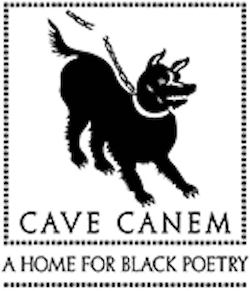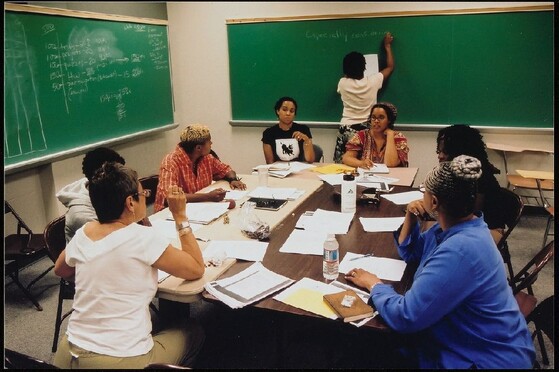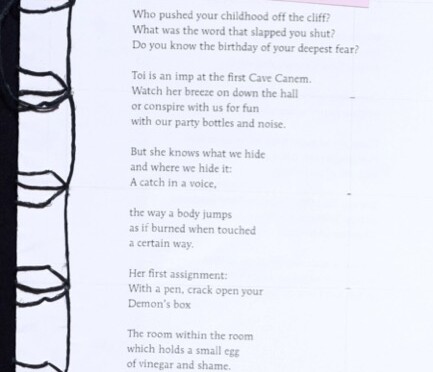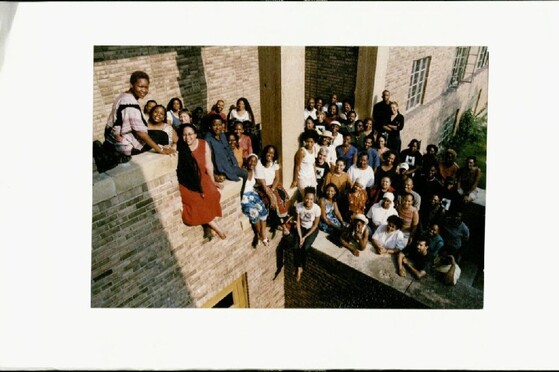Founded in 1996 by poets Toi Derricotte and Cornelius Eady, Cave Canem Foundation has become a center of African American poetry with a wealth of programming, including a renowned summer retreat.
The Cave Canem Foundation Records are available for use at the Beinecke Library, and provide an incomparable opportunity to dive into the African American poetry community from 1999 to the present. Its fellowship includes prominent contemporary poets, such as winners of the Pulitzer Prize for Poetry and the National Book Award.
Call number: JWJ MSS 130
This video provides a glimpse into the Cave Canem papers and the atmosphere of the organization’s summer retreat. Consider, for example, one image from the video, which showcases the front cover of a collection of poems written by Eady for Derricotte. The poems are presented in a handsewn practice chapbook made by Sarah Micklem, Eady’s wife and another instrumental figure in the founding of Cave Canem. This chapbook connects to a network of documents and photographs in the collection, which together speak to the origins of Cave Canem’s summer retreat and give an impression of the deep sense of community that Cave Canem provides.
The first poem in Eady’s chapbook revolves around Derricotte: Eady writes, “Toi is an imp at the first Cave Canem.” As the first poem in the chapbook, “Toi” demonstrates how the summer retreat can quite literally serve as the basis of participants’ work, but also hints at the nature of the community built at the first retreat. There is clearly a sense of joyfulness and play, as Derricotte “conspire[s] with us for fun / with our party bottles and noise.” Community, however, is not just “fun,” but is also a space in which to turn inward, even if this experience is painful. Derricotte “knows what we hide / and where we hide it,” and poetry urges participants to find their own “small egg[s] / of vinegar and shame.” These lines speak to the particular nature of Cave Canem’s community. Cave Canem retreats are spaces of affirmation, as they celebrate African American poets. However, they are also spaces of challenge, as they resist the isolation that faces African American poets in the literary world.
A second poem, “Father Francis at Mount St. Alphonsus,” references the location of the first five years of the Cave Canem summer retreat and workshop: Mount St. Alphonsus Retreat Center in Esopus, NY. The Cave Canem Foundation Records contain a wealth of photographs from the early years of the retreat at Mount St. Alphonsus, allowing viewers to get a sense of the place and the people that shaped Cave Canem in its early years. Father Francis, the subject of the poem, resurfaces elsewhere in the collection. In a testimonial, Cave Canem fellow Carrie Allen McCray describes the spirit of community at Cave Canem, recounting a scene from a ceremony on the last night of the retreat, when Father Francis told the fellows, “Of all the groups I’ve been responsible for through the years, I’ve never seen such love. I think it’s born out of your struggle.”
The documents and photographs in the Cave Canem papers demonstrate how the Foundation has transformed the underrepresentation of African American poets into a celebrated and wide-ranging organization that pushes contemporary poetry ever into the future.

EXPLORE Cave Canem in the Digital Library
WATCH Cornelius Eady: Creativity in Isolation
READ Acquistion of the Cave Canem Foundation Records
READ Cave Canem’s National Book Foundation’s Literarian Award
WATCH Toi Derricotte: Creativity in Isolation, part 1 of 3
WATCH Toi Derricotte: Creativity in Isolation, part 2 of 3
WATCH Toi Derricotte: Creativity in Isolation, part 3 of 3
Text written by Isabel Prioleau, Yale College, Class of 2025 and compiled into this format by Claire Barnes, Yale Divinity School, Class of 2022.


